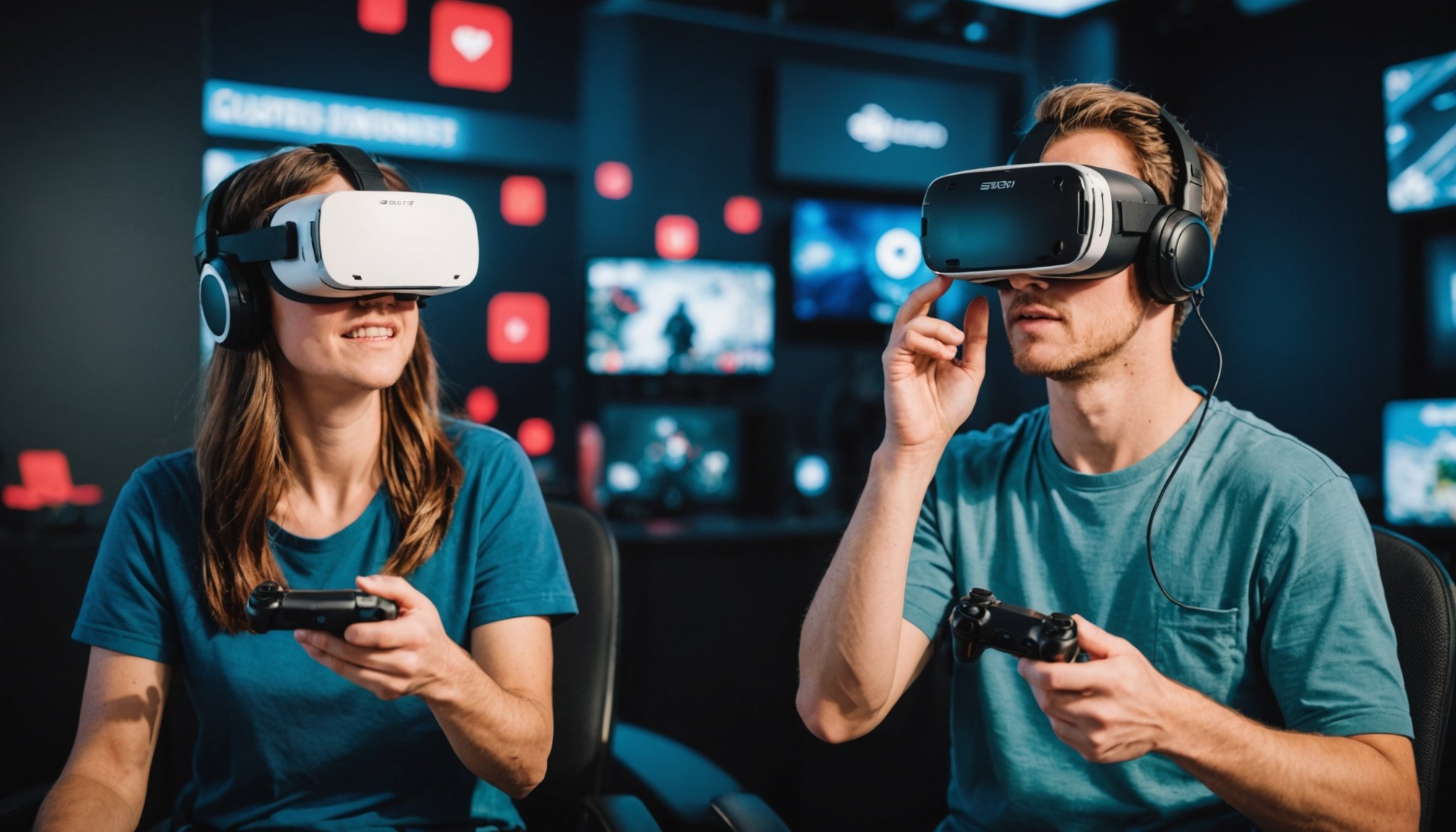Launching Your UK Virtual Reality Gaming Business: A Guide to Navigating Age-Appropriate Content Regulations
Understanding the Landscape of Virtual Reality Gaming in the UK
As virtual reality (VR) and augmented reality (AR) technologies continue to revolutionize the gaming industry, the UK has emerged as a hub for innovation and growth. However, with this growth comes the critical need to navigate the complex landscape of age-appropriate content regulations. If you’re considering launching a VR gaming business in the UK, it’s essential to understand the legal, ethical, and practical aspects of ensuring your content is suitable for all ages.
The Importance of Age-Appropriate Content
Age-appropriate content is not just a legal requirement but also a moral and business imperative. Parents and guardians are increasingly vigilant about the content their children are exposed to, and failing to meet these standards can damage your reputation and lead to legal repercussions. As noted by the British Board of Film Classification (BBFC), “Age ratings and content guidelines are crucial in helping parents make informed decisions about what their children watch and play”.
This might interest you : Mastering the Setup: A Comprehensive Guide to Launching Your Renewable Energy Storage Business in the UK
Key Legislation and Regulations
Navigating the legal landscape is a crucial step in setting up your VR gaming business. Here are some key pieces of legislation and regulations you need to be aware of:
Digital Economy Act 2017
This act mandates age verification for online content, ensuring that games are accessed only by the appropriate age group. This means you must implement robust age verification mechanisms to prevent minors from accessing content that is not suitable for them.
Topic to read : Ai coaching platform: unlocking scalable, personalized workforce transformation
Video Recordings Act 1984
All video content, including games, must be classified before being sold or rented. This classification helps in ensuring that the content is suitable for the intended age group. The BBFC is responsible for providing these age ratings and content guidelines.
Data Protection Regulations
Your business must adhere to data protection regulations, such as those outlined by the Information Commissioner’s Office (ICO). This involves handling user data responsibly and ensuring that all data collection and storage practices are transparent and secure.
Required Licenses and Permits
To operate legally, you will need to obtain the necessary licenses and permits. Here are some key ones:
- Gambling Commission License: If any element of your game involves gambling, you must obtain a license from the Gambling Commission.
- Data Protection Registration: You need to register with the ICO to ensure compliance with data protection laws.
- Other Permits: Depending on the nature of your business, you may need other permits or licenses. For example, if you are using certain types of software or technology, you might need specific permissions.
Best Practices for Developing Age-Appropriate Content
Developing age-appropriate content is a multifaceted process that involves several best practices:
Market Research and Target Audience
- Conduct thorough market research to understand your target audience. This includes understanding the age demographics and preferences of your users.
- Collaborate with child psychologists to evaluate the suitability of your content for different age groups.
Content Evaluation and Updates
- Regularly update your games to comply with the latest regulations and standards.
- Ensure that all content is reviewed and rated appropriately before release.
Parental Controls and User Safety
- Implement robust parental controls to allow parents to monitor and control the content their children access.
- Provide clear information and tools to help parents make informed decisions about the games their children play.
Tools and Resources for Compliance
Navigating the complex landscape of regulations can be challenging, but there are several tools and resources available to help:
Regulatory Bodies
- British Board of Film Classification (BBFC): Provides age ratings and content guidelines.
- Gambling Commission: Oversees games with gambling elements.
- Information Commissioner’s Office (ICO): Ensures data protection compliance.
Compliance Resources
- Consult with legal experts specializing in gaming laws.
- Attend workshops or seminars hosted by regulatory bodies.
- Use compliance software and tools to streamline the process of adhering to regulations.
Practical Steps to Establish Your VR Gaming Business
Starting a VR gaming business in the UK involves several practical steps:
Business Plan
- Develop a solid business plan that outlines your vision, goals, and compliance strategy.
- Ensure your plan includes a detailed section on how you will comply with UK regulations.
Business Setup
- Register your company with Companies House.
- Obtain any necessary licenses and permits.
- Set up a business bank account and ensure your company structure aligns with your long-term objectives.
Funding
- Explore various funding options such as venture capital, government grants, or crowdfunding.
- Choose the funding option that best suits your company’s needs and growth plans.
Example of a Successful VR Gaming Company
To illustrate the importance of compliance, let’s consider an example of a successful VR gaming company that has navigated these regulations effectively.
Case Study: A UK-Based VR Gaming Startup
A UK-based VR gaming startup, let’s call it “VR Innovations,” recently launched a new game that quickly gained popularity among young gamers. Before launching, the company conducted extensive market research and collaborated with child psychologists to ensure the content was suitable for children. They implemented robust age verification mechanisms and parental controls, and regularly updated the game to comply with the latest regulations.
Quote from VR Innovations’ CEO:
“Ensuring our content is age-appropriate is not just about complying with the law; it’s about building trust with our users and their parents. By prioritizing user safety and compliance, we have been able to create a game that is both fun and safe for all ages.”
Table: Key Regulations and Compliance Requirements
| Regulation | Description | Compliance Requirement |
|---|---|---|
| Digital Economy Act 2017 | Age verification for online content | Implement robust age verification mechanisms |
| Video Recordings Act 1984 | Classification of video content | Obtain age ratings from BBFC before release |
| Data Protection Regulations | Handling user data responsibly | Register with ICO, ensure transparent data practices |
| Gambling Commission | Oversight of games with gambling elements | Obtain license from Gambling Commission if applicable |
| Parental Controls | Monitoring and control of content access | Implement parental controls, provide clear information |
Detailed Bullet Point List: Best Practices for Age-Appropriate Content
-
Conduct Market Research:
-
Understand the target audience demographics and preferences.
-
Identify potential risks and areas of concern.
-
Collaborate with Experts:
-
Work with child psychologists to evaluate content suitability.
-
Consult with legal experts to ensure compliance with regulations.
-
Regular Updates:
-
Update games regularly to comply with the latest regulations and standards.
-
Ensure all content is reviewed and rated appropriately before release.
-
Parental Controls:
-
Implement robust parental controls to allow parents to monitor and control content access.
-
Provide clear information and tools to help parents make informed decisions.
-
User Safety:
-
Ensure all games are designed with user safety in mind.
-
Provide mechanisms for users to report any concerns or issues.
-
Transparency:
-
Be transparent about data collection and storage practices.
-
Provide clear terms of service and privacy policies.
The Future of VR Gaming and Compliance
As VR technology continues to evolve, the importance of compliance will only grow. Here are some trends and future considerations:
Emerging Technologies
- Augmented Reality (AR): AR is becoming increasingly integrated into gaming, offering new challenges and opportunities for compliance.
- Web3 and Blockchain: The use of blockchain and web3 technologies in gaming raises new questions about data protection and user safety.
Social Media and Online Safety
- Social Media Integration: Games that integrate with social media platforms must comply with additional regulations and ensure user safety in these environments.
- Online Safety: Ensuring online safety is a continuous challenge, and businesses must stay updated with the latest guidelines and best practices.
User-Generated Content
- Content Moderation: As user-generated content becomes more prevalent, businesses must implement effective content moderation strategies to ensure all content is age-appropriate.
- Generated Content Risks: Understanding the risks associated with user-generated content and having mechanisms in place to mitigate these risks is crucial.
Launching a VR gaming business in the UK requires a deep understanding of age-appropriate content regulations. By following the best practices outlined above, complying with key legislation, and utilizing available resources, you can ensure your business is both successful and compliant. Remember, compliance is not just about avoiding legal repercussions; it’s about building trust with your users and contributing to a safer and more responsible gaming industry.
Quote from techUK:
“The UK is home to emerging technologies that have the power to revolutionise entire industries. By working together with Government and other stakeholders, we can build an innovation ecosystem that benefits people, society, economy, and the planet”.
By navigating the complex landscape of regulations effectively, you can set your VR gaming business up for success and contribute to the vibrant and innovative tech sector in the UK.






